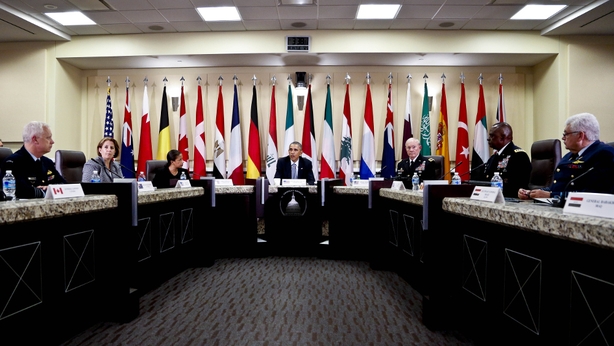The US military believes it has killed several hundred Islamic State fighters in air strikes in and around the Syrian town of Kobane, a Pentagon spokesman said.
However, Rear Admiral John Kirby warned that despite the increase number of air strikes around the town, it could still fall to IS militants.
He said the self-proclaimed Islamic State has made "no secret of the fact that they want that town...and so they have continued to flow fighters to Kobane".
The battle for the northern Syrian town is entering its second month.
Adm Kirby said only "hundreds or so" civilians remain.
"Certainly if Kobane falls to ISIL (IS) that's a setback, there's no question about that," he said.
However, he also stressed that the strategy for Operation Inherent Resolve, the new name for the US-led campaign against IS jihadists, is "bigger" than any one town.
"We ought to be prepared for the eventuality that other towns and other villages, other pieces of ground will either fall to ISIL or we may not be able to dislodge them for quite some time. This is going to take a while," he said.
In neighbouring Iraq, where IS controls large chunks of territory, the jihadists are threatening Baghdad, but the Pentagon does not believe they are on the verge of capturing the capital city.
"We do not believe that there is an imminent threat to the security of the city right now," Adm Kirby said.
US President Barack Obama voiced concern over the plight of Kobane, but warned that the campaign would be a "long-term" struggle.
"Obviously at this point we're also focused on the fighting that is taking place in Iraq's Anbar province, and we're deeply concerned about the situation in and around the Syrian town of Kobane," he said.
He said the battles in Anbar and Kobane underscored the threat IS posed in both Iraq and Syria, and "coalition air strikes will continue in both these areas".
Mr Obama cited "important successes" in the two-month-old campaign.

He pointed to a successful bid to retake Mosul dam in Iraq and halting the IS group's advance on Irbil.
He also hailed the coalition for having saved "many civilians from massacre" on Mount Sinjar, and destroying IS targets across Iraq and Syria.
However, despite daily bombing raids in Iraq since 8 August and in Syria since 23 September, IS fighters have continued to advance.
The Sunni extremists are now threatening to seize the whole of Anbar province in Iraq and a long stretch of territory along Syria's border with Turkey.
The US strategy has come in for sharp criticism but Mr Obama appealed for patience.
He said coalition commanders agreed there would be no rapid victory and were committed to a united front against IS militants.
"One of the things that has emerged from the discussions ... is that this is going to be a long-term campaign," he said.
"There are not quick fixes involved. We're still at the early stages.
"As with any military effort, there will be days of progress and there are going to be periods of setback, but our coalition is united behind this long-term effort."
The US military's top-ranking officer, General Martin Dempsey, hosted the talks at Andrews Air Force base outside Washington.
It was the first gathering of top brass from so many nations since the coalition against IS was formed in September.
Among those attending the meeting were officers from all five Arab states taking part in the Syria air campaign.
Countries taking part in the meeting were: Australia, Bahrain, Belgium, Britain, Canada, Denmark, Egypt, France, Germany, Iraq, Italy, Jordan, Kuwait, Lebanon, the Netherlands, New Zealand, Qatar, Saudi Arabia, Spain, Turkey, the United Arab Emirates and the United States.

